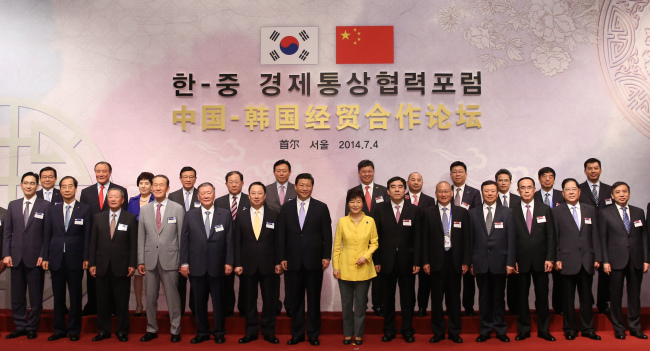South Korean President Park Geun-hye and Chinese President Xi Jinping reiterated the importance of further expanding the two countries’ strategic partnership that could boost business exchanges and investments via trade.
In a meeting with some 500 business leaders and executives from both sides at a forum in Seoul Friday, the Chinese president stressed that China and Korea should “grow side by side through close collaboration.”
 |
President Park Geun-hye (front, seventh from right) poses with her Chinese counterpart Xi Jinping (front, eighth from right) and business representatives from South Korea and China at a forum held at Hotel Shilla in Seoul on Friday. (Yonhap) |
President Park also said that the two partners should take a new path that would spur the growth of the two countries and bring them closer together over the next 20 years, while looking back on their relationship since they established diplomatic ties in 1992.
She added that their new and improved relations should lead them to not only cooperate in manufacturing but also in fields such as services.
“The partnership between the two sides should diversify by focusing on (business) collaborations in services, from manufacturing, as a means to expand our two markets,” the Korean president told the business delegations from both sides.
“We should build an environment in which both sides can stably exchange goods through a bilateral free trade agreement.”
A number of agreements have been made between Korean and Chinese companies.
POSCO and Chongqing Iron and Steel will invest in a mill powered by the Korean steel giant’s FINEX technology and in mining development.
SKC and China-based TCL will collaborate on parts manufacturing for LED televisions and smartphones, while SK Telecom will work with Zhengwe Group on information, communication and telecommunication.
Park also proposed her vision of the “Eurasia Initiative,” which would go hand in hand with President Xi’s “Silk Road Economic Belt.” Both are aimed at boosting regional economic integration through infrastructure and trade.
President Xi presented the plan, or the “New Silk Road,” at the ASEAN-China Summit in Indonesia last year to reconnect regional economies along the ancient Silk Road to increase trade and cultural exchanges.
Korea will also seek to expand business ties with China in areas of machineries, materials and petrochemicals, and fully support China in developing its seven key strategic industries ― new energy, new-energy vehicles, new materials, environmental technology, biotechnology, next-generation information technology and advanced equipment manufacturing technology.
China has been promoting such industries over the last three years to develop the country into an innovation and technology-driven economy from a manufacturing-focused one. The world’s second largest economy seeks to make the new emerging industries to account for 15 percent of its gross domestic product growth by 2020.
President Park and President Xi held a summit on Thursday, showing their commitments to sealing a free trade deal and establishing a renminbi clearing and settlement center in Korea.
The currency exchanges would allow businesses from Korea and China to directly settle their trade payments in yuan without having to pay extra transaction costs converting their respective currencies into dollars.
By Park Hyong-ki (
hkp@heraldcorp.com)








